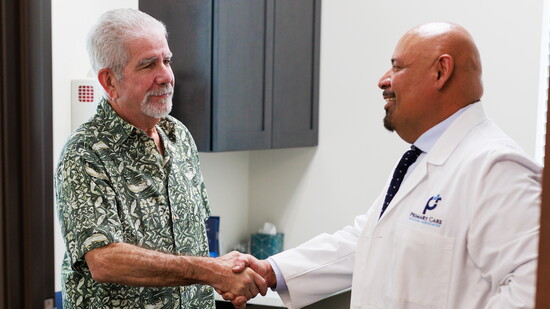Hormonal health plays a vital role in every person’s overall well-being, but it’s often an area that gets overlooked, particularly for men as they age. Just like women’s hormone therapy, men’s hormone management is just as crucial for maintaining health, vitality, and quality of life. Carlos Porter, M.D., is a seasoned family physician with Primary Care Medical Associates who specializes in hormone therapy for men, offering a range of services designed to balance hormones and promote overall health.
Porter’s career began with an undergraduate degree from St. Mary’s University in San Antonio, followed by medical school, residency, and an internship at the University of Texas Health Science Center, where he studied family medicine. Today, his practice focuses on caring for adults of all ages, with an emphasis on managing chronic conditions, including heart disease, hypertension, and infections. However, one of the most critical areas of focus in his practice is men’s and women’s hormone therapy.
The Importance of Finding Balance
One of the main reasons men seek hormone therapy is to counteract the effects of aging, which can include weight gain, increased fatigue, and a loss of strength. “As men age, they begin to lose muscle mass, and their sexual health often declines, which can affect their relationships,” Porter explains.
Men often experience a range of symptoms that can signal a need for hormone therapy, from gradual weight gain and loss of strength to more significant health concerns like fatigue and decreased activity levels. “They put on 10 to 15 pounds per year, become more sedentary, and as a result, feel more fatigued,” Porter says. These changes often lead to a decrease in physical activity, which can further worsen the situation, creating a vicious cycle of declining health.
However, hormone imbalances can also be exacerbated by other factors. Chronic use of pain medications, obesity, and even the misuse of steroids can all interfere with natural testosterone production. "Steroid use can reduce natural testosterone production, which is why it’s important to consider hormone therapy that is medically supervised,” Porter notes. This professional approach is critical because self-directed care is not as reliable as medically approved treatments and can lead to further complications.
How Hormone Therapy Works
Therapy isn’t just about treating numbers on a lab sheet; it’s about holistic wellness. Porter explains that the treatment is about addressing the broader impact of hormone imbalances on daily life. Testosterone therapy, in particular, plays a crucial role in restoring what men lose over time. “Testosterone therapy supports muscle mass, sexual health, and, in a lot of ways, it turns back the clock for men,” says Porter.
During an initial visit, Porter takes the time to understand the patient’s medical history, goals, and symptoms. “We don’t just treat off a number; we treat off of wellness,” he explains. After an examination and blood work to assess hormone levels, Porter develops a treatment plan tailored to the individual.
The practice offers a variety of testosterone replacement options, including injections and pellet therapy. Injections are typically administered weekly, which can cause fluctuations in hormone levels. For a more consistent and long-term solution, Porter recommends pellet therapy. A small pellet is injected under the skin, releasing testosterone gradually over four months. This approach helps maintain more consistent hormone levels, resulting in a smoother and more reliable experience for patients.
The Rewarding Aspects of Hormone Therapy
Porter says his favorite part of the job is the variety and the ability to create personalized care for each patient. Unlike specialists who treat acute conditions, Porter practices family medicine, which allows him to care for patients on a long-term basis, considering the full spectrum of their health. “We treat longitudinally. Family medicine is all about helping people live better, fuller lives,” he says. This approach to care enables him to monitor progress over time, adjust treatment plans, and ensure that each patient’s needs are met most effectively.
Ultimately, Porter’s goal is straightforward: to enhance his patients’ quality of life. “Patients are not an algorithm,” he says. “We think through the problem and then find the best solution.” For men dealing with the effects of aging or hormone imbalances, hormone therapy can provide a path toward regaining their strength, vitality, and confidence, leading to a better, more active life.
pcmatx.com | 210-903-2002 | 9091 Fair Oaks Pkwy., Ste.301, Fair Oaks Ranch
PULL QUOTE:
“Patients are not an algorithm; we think through the problem and then find the best solution.”
